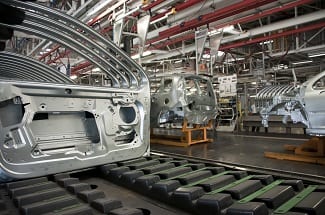How to Qualify for the Automotive Supplier Innovation Program (ASIP)

As part of the Government of Canada’s 2015 Economic Action Plan, the Automotive Supplier Innovation Program (ASIP) provides Canadian government funding to businesses demonstrating and prototyping innovative automotive products or processes. Through this business funding opportunity, more Canadian businesses will be able to contribute clean, sustainable, and energy efficient technologies to a market that is in high demand for these innovations.
Canadian automotive suppliers can receive up to 50% of eligible project costs to a maximum $10 million in grant funding through ASIP for projects that expand the country’s automotive supply chain and enhance industry competitiveness.
Canadian businesses that have already considered ASIP’s program overview and are wondering if they’re eligible to receive this automotive funding should review the program’s company, project, and expense eligibility below.
Canadian Businesses That Qualify for the Automotive Supplier Innovation Program
A wide range of Canadian automotive businesses will be able to apply for ASIP government funding. To meet the general eligibility requirements for participation, businesses must:
- Be an established, for-profit, Canadian company; and
- Maintain fewer than 500 employees OR earn less than $1 billion in annual global revenues.
Potential ASIP applicants that maintain in excess of 500 employees, or conduct greater than $1 billion in revenue may still be eligible to receive funding for their project, but must incorporate at least one small or mid-sized business (SMB) from across Canada. The ASIP program is specifically mandated to support the growth of Canadian SMBs and must therefore include at least one for a successful funding application.
ASIP Government Business Funding: Project Eligibility
Canadian government funding will be provided for technology development, demonstration, and prototyping activities conducted within Canada. This includes, but is not limited to:
- Development of new, innovative technologies, products, or processes;
- Engineering, designing, or prototyping these new innovations; and
- Product testing and validation.
Assessing Project Fit: Technology Readiness Level (TRL)
Furthermore, projects will be assessed on the innovation’s technology readiness level (TRL). Technologies with a TRL of 4-7 are high-priority for the Automotive Supplier Innovation Program and have the greatest probability of being accepted. These levels are specified as:
- Level 4: Component Validation in a Laboratory Environment
- Level 5: Component Validation in a Simulated Environment
- Level 6: System Model/ Prototype Demonstration in a Simulated Environment
- Level 7: Prototype Ready for Demonstration in Operational Environment
Assessing Project Importance: ASIP Application Evaluation Criteria
Technology readiness levels are only a small part of the evaluation process for ASIP automotive industry funding. Beyond TRL, there are a number of criteria that are used to determine a project’s suitability for ASIP, including:
- Innovation: Project is original, within a TRL of 4-7, and provides opportunities for post-secondary research institution collaboration.
- Market Relevance: Project responds to real industry needs and will produce a product/ process that enhanced the industry’s performance.
- Economic Benefits: Potential economic advantages for the country, such as an increase in jobs, skills, or investment, as well as the integration of Canadian suppliers in global supply chains.
- Environmental Benefits: Environmental impacts resulting from product or process development, such as reductions in input materials or creating products that are lighter and use less energy.
- Science and Technology Benefits: How closely the project supports Canada’s Science and Technology Strategy, including creating and expanding access to knowledge resources.
- Applicant Strength/ Capability: The financial resources, managerial skill, and technical team experience to execute project activities and deliver expected outcomes.
What types of expenses are eligible for ASIP automotive industry funding?
Canadian automotive suppliers may receive up to 50% of eligible project expenses to a maximum $10 million, including expenses such as:
- Direct Labour: Non-recurring costs that can be directly attributed to the completion of project deliverables. Includes salaries, wages, and benefits incurred.
- Materials: Those used for prototypes, and configuring testing processes/ systems.
- Specialized Equipment: Equipment necessary specifically for the project. This could be special testing equipment, instrumentation, and ancillary systems.
- Overhead Costs: Based on the Canada Revenue Agency’s Overhead Proxy Rate or Public Works and Government Services Canada (PWGSC) rates.
- Other Direct Costs: Other costs deemed necessary for project completion, but are not materials or and labour.
Expenses Not Eligible for Automotive Supplier Innovation Program Funding
Some costs, including any fees that are not directly required for project completion, cannot be included in a business’ statement of project expenses. These include:
- Regular maintenance, normal operating costs, and facility re-tooling;
- Equipment and other technology upgrades that do not provide a substantial innovation boost;
- Purchasing, constructing, or expanding buildings;
- Unreasonable compensation (including salaries, wages, or benefits) of officers and employees; and
- Preparation of the ASIP application or other required documentation.
Learn More About the Automotive Supplier Innovation Program
Recent Automotive Supplier Innovation Program Blogs:
- Automotive Supplier Innovation Program Invests $11.5M in Manufacturing R&D
- How Electric Vehicles are Gaining Worldwide Popularity
- $3M in Automotive Technology Grants Support Vehicle Lightweighting
- $1.9M in Research Grants Awarded to Improve Automotive Technology
- Automotive Technology Encourages Alert Driving Through Smarter Seats
